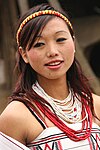Phom Naga
| Regions with significant populations | |
|---|---|
| Nagaland, India | 54416 (2011)[1] |
| Languages | |
| Phom language | |
| Religion | |
| Christianity | |
| Related ethnic groups | |
| Other Naga tribes | |
Phom is a Naga tribe from Nagaland, India. Their traditional territory lies between the territories of Konyak in the north-east, the Ao in the west and the Chang in the south. Yongnyah is the largest Phom village.
Economy[edit | edit source]
Agriculture is the traditional occupation of the Phoms, and the tribe practices jhum cultivation. The Phoms also have a tradition of pottery, bamboo work and spinning.[2]
Origin[edit | edit source]
The origin of the Phoms, like that of other Naga tribes, is uncertain. One oral tradition of the Phoms, like that of the Ao Nagas, states that their ancestors originated from stones.[3] They also believe that their ancestors migrated to Mt. Yungnyü (a mountainous Hill in Longleng district) and from their separated to different villages.[citation needed]
Culture[edit | edit source]
Clothing[edit | edit source]
After the advent of Christianity, many modern Phoms have adopted contemporary clothing, though traditional dress is worn during festivals. The traditional Phom dressing was indicative of the social status of the wearer. The ordinary clothing included a white (vihe-ashak) or a dark blue (nempong-ashak) shawl-like body wrap. A man who had taken a head or offered feasts had the privilege to wear a cowrie-ornamented shawl (fanet-henyu). The women used to wear skirts called shung-nang, which came in different colors, designs and bands.[2]
Practices[edit | edit source]
Like the Konyaks and the Chang, they bury their dead in the ground.[2]
Festivals[edit | edit source]
The Phoms have 4 major festivals, the most important of which is Monyü. The others are Moha, Bongvum and Paangmo.[4]
Monyü[edit | edit source]
Monyü is the most important traditional festival of the Phoms. It is a 12-day festival, which marks the end of winter and onset of summer (usually 1–6 April). The festival involves community feasting, dancing, singing and social work (such as repairs and construction of bridges). During the festival, the men present their married daughters or sisters with pure rice beer and special food to show their affection and respect.
One or two days before the festival, its arrival is signaled by beating log drums with a distinct tune called Lan Nyangshem. The priests or the village elders predict whether the festival would bring a blessing or a curse.[4]
- Day 1 (Shongten-Laiphen)
- Overall preparation is done for the festivities. Households participate in collection of wrapping leaves and bamboos.
- Day 2
- Brewing of rice beer.
- Day 3 (Aiha Okshok)
- Feasting, dancing and merry-making.
The second day is for compulsory brewing of all kinds of rice beer.
- Day 4 (Chingi Okshok)
- General festivity and arrival of guests from neighbouring villages.
- Day 5 (Paangmohah)
- Parties of men wear colorful costumes and indulge in drinking, dancing and celebrating with friends.
- Day 6
- Elders feast by exchanging pure rice beer and meat. The young villagers feast together at the outskirts of the village.
References[edit | edit source]
- ↑ https://www.censusindia.gov.in/2011census/C-16.html
- ↑ 2.0 2.1 2.2 Ved Prakash (2007). Encyclopaedia Of North-east India Vol# 5. Atlantic. pp. 2129–2131. ISBN 978-81-269-0707-6.
- ↑ Braja Bihari Kumara (2005). Naga Identity. Concept. p. 54. ISBN 978-81-8069-192-8.
- ↑ 4.0 4.1 "The Festivals of Phom Tribe". Tuensang District Administration. Retrieved 25 October 2011.
